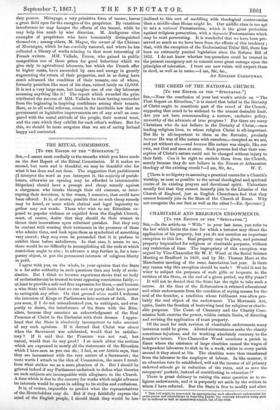THE CREED OF THE NATIONAL CHURCH.
[To THE EDITOR OF THE " SPECTATOR.") SIR,—Near the conclusion of your last week's article on " The First Report on Ritualism," it is stated that belief in the Divinity of Christ ought to constitute part of the creed of the Church, supposing that creed to be widened to the utmost desirable limit. Are you not here recommending a narrow, exclusive policy, unworthy of the advocate of true progress ? For there are many Christians who do not believe in the Divinity of Christ,—men leading religious lives, to whose religion Christ is all-important. But He is all-important to them as the Revealer, precisely because He was of like nature with ourselves,—tempted as we are, and yet without sin,—and because His nature was simple, like our own, not God and man at once. Such persons feel that their con- ception of Christ's nature could not be changed without injury to their faith. Can it be right to exclude them from the Church, merely because they do not believe in the Nicene or Athanasian
theology of the existing creeds ?—I am, Sir, &c., W. T.
[There is no bigotry in assuming a practical centre for a Church's worship, as near as possible to the actual theological and spiritual centre of its existing prayers and devotional spirit. Unitarians usually feel that they cannot honestly join in the Litanies of the Church of England, just as English Churchmen feel that they cannot honestly join in the Mass of the Church of Rome. Why not recognize the one fact as well as the other?—ED. Spectator.]






























 Previous page
Previous page